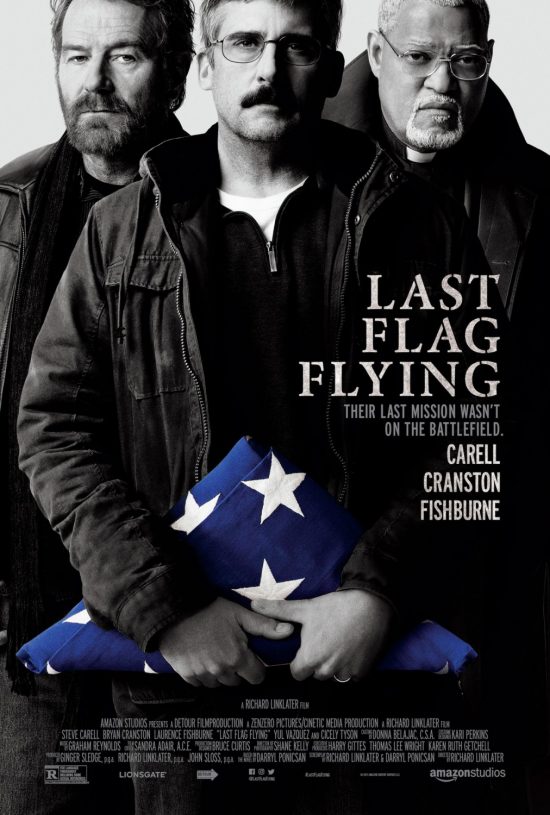London Film Festival Review: Last Flag Flying
Last Flag Flying is the latest Richard Linklater film, and it’s a quasi-sequel to Hal Ashby’s The Last Detail (1973). Originally the plan was to make a direct sequel with at least Jack Nicholson reprising his role with Alexander Payne, but that project fell through. The best way to describe what Linklater ended up making would be as a sequel to a non-existent version of The Last Detail, in which the characters served in Vietnam together and the events in the original had actually happened overseas during the war.
The film is set 30 years after the events of The Last Detail. The catalyst for a reunion between the old war buddies is that the son of the Larry “Doc” Shepherd, played by Steve Carell, has died in Iraq. Shepherd seeks out his former Army friends online and meets up with them to take his son home. Sal Nealon (Bryan Cranston, in the role originally played by Jack Nicholson) has remained the same foul-mouthed, womanising man as always, whereas Richard Mueller (Laurence Fishburne) has become a preacher. All of the characters’ names have been changed to make Last Flag Flying its own thing and avoid constant comparisons to the original—probably a smart move on the filmmaker’s part.
In many ways it is the story of these three men on the road, as in the original, but with the new context of the characters growing old. However, even the man who has changed the most reverts back to his old ways to some extent.
For Cranston, it’s probably the best thing he’s done since Breaking Bad aside of Trumbo. He’s so good because he decided, understandably, not to do a Jack Nicholson. It certainly gets that turn-of-the-century Iraq-era atmosphere right, hitting all the right notes of the US during that conflict. There’s material about the media blackout of footage of soldiers coming home in coffins, for instance, and it’s set around the time of Saddam Hussein’s capture.
It’s as funny, if not funnier, than the original, and also very moving. The casting of Laurence Fishburne was a smart choice, as he was in the greatest of all Vietnam films, Apocalypse Now, which adds another dimension to it. The real standout, however is Steve Carell, which is a bit of a shock. Carell is best known for his comedic roles, but he has been moving into more dramatic roles in recent years in films like The Big Short and Foxcatcher. In this film, he really comes into his own as a dramatic actor. He has a moustache that somehow gives him a constantly sad face, and it’s his story, in which he somehow has to come to terms with his son’s tragic death.
Some have called it an anti-war but pro-soldier film, but only one of the younger Army personnel the three men encounter is anything but a by-the-book robot—and the film does not put them in a good light. The death of Larry’s son links back to the past death of a comrade in Vietnam, about which they had not told the whole truth, because Larry learns he has also been lied to about the circumstances.
Linklater has become a great humanist filmmaker, putting the stories of average people on screen in a way that no one else really does. It’s not a showy film, but it’s well-shot, and the focus is on the characters and their relationships. The interplay between the three main characters hearkens back to the original The Last Detail thanks to excellent casting.












